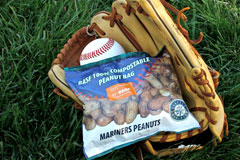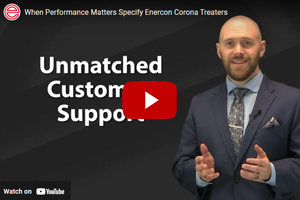Sustainability | BASF, Mariners Debut Compostable Snack Bags
- Published: October 04, 2012
 SEATTLE, WA & WYANDOTTE, MI | BASF has made a game-changing breakthrough toward sustainable snack packaging that can help companies and communities everywhere get closer to their goal of zero waste.
SEATTLE, WA & WYANDOTTE, MI | BASF has made a game-changing breakthrough toward sustainable snack packaging that can help companies and communities everywhere get closer to their goal of zero waste.
BASF partnered with one of the greenest teams in Major League Baseball, the Seattle Mariners, and used the iconic snack of the American pastime, peanuts, to debut prototype packaging developed with its advanced biopolymer technology. The first 10,000 fans to arrive at Safeco Field on September 5 to see the Seattle Mariners take on the Boston Red Sox each received a free bag of peanuts in a 100% compostable snack bag.
“Flexible packaging with this BASF technology is a big step forward for the snack food industry,” said Kimberley Schiltz, BASF’s market development manager consumer packaging. “It means that popular snack foods can be brought to market in compostable packaging that delivers needed shelf-life at a competitive price point, with a more sustainable ‘end-of-life’ solution than with conventional packaging materials.”
As a member of the Green Sports Alliance, the Seattle Mariners’ aggressive zero-waste goals make Safeco Field a natural place for BASF to introduce this new sustainable snack packaging to the American public. This season, the team is on track to divert 85% of its waste from landfills, up from just 12% in 2006. Mariners VP of Operations, Scott Jenkins, has his sights set on 90% diversion, but closing the gap has proven to be an elusive goal. “All of our service ware is already compostable, but snack food bags have been one of the biggest barriers preventing us from getting to our goal,” said Jenkins. “Flexible packaging made with BASF biopolymers could represent the holy grail of greening for our waste stream.”
Like all advances in sustainability, major breakthroughs must balance economic and environmental interests. As Jenkins puts it, “Whenever there are contaminants in our compost stream, like regular snack bags and candy wrappers, we have to pay a premium to have them removed by hand. If all of the snacks sold at Safeco came in compostable packaging, it would represent a significant savings of time and money for the team and get us a whole lot closer to achieving zero waste.”
People who follow the industry may remember earlier attempts to introduce fully compostable snack packaging that fell short of consumer expectations. BASF’s biopolymers technology can meet those expectations and provide a viable solution to the snack food packaging industry.
“Compostable snack food packaging made with BASF’s advanced technology can put us much further down the path to a zero-waste world, much faster,” said Stephan Banchero, Cedar Grove Composting general manager.
As municipalities grapple with how best to implement greening initiatives and engage citizens, this kind of technology could represent a more convenient alternative to the punitive approach already in place in some cities. “We welcome technological advances like this that inspire our entire society to move toward sustainability and help municipalities like the City of Seattle divert more waste than ever away from landfills.” said Brett Stav, Seattle Public Utilities, senior planning & development specialist.
This email address is being protected from spambots. You need JavaScript enabled to view it.





